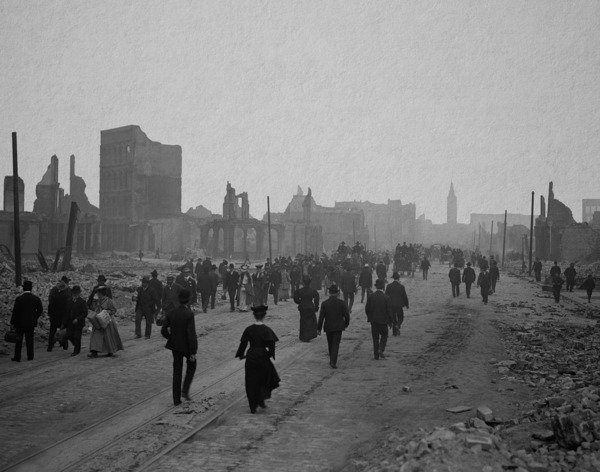Archive
Disaster sociology’s lessons on the US COVID-19 response

The field of disaster sociology, or the sociology of disaster, was born out of a need to understand the social impacts of a wide range of catastrophes and since its beginnings in the early 20th century, sociologists have been on the ground studying everything from earthquakes, terrorist attacks, and even the Exxon Valdez oil spill. The work has been vital in helping victims of disasters get back on their feet and has been employed by US government organizations like FEMA (the Federal Emergency Management Agency) and the U.S. Air Force (during the Cuban Missile Crisis). In fact, a good chunk of disaster sociology that’s available on the internet can be found on US government websites, especially FEMA’s website[1]. It is certainly easy to point out mistakes after the fact, but here are a few critical missteps in the US response to COVID-19 that may have been avoided if only we had paid more attention to what sociologists have been telling us for years.
We promise not to panic (as long as we have enough toilet paper)
“Individuals can deal with the truth of certain dangers more adequately than they can deal with misinformation which is later contradicted by experience.”
-Dynes et al, in a 1972 report[2] published by the US Government’s Defense Technical Information Center.
One key insight from disaster sociology is that although it does happen occasionally, disaster situations do not typically produce collective panic. This might go against what we’ve been taught by zombie movies where the living can be every bit as dangerous as the undead, but this sort of mass panic is a popular myth that has been repeatedly refuted by sociological research. This, in fact, might be the most well-known contribution of sociology in the field of disaster management. Unfortunately, it is a myth that public officials continue to use as the reasoning for their disaster responses, namely in decisions to not disseminate full, accurate information to the public. Whether the information is about the strength of an incoming hurricane or how infectious or lethal a virus is, people are better off if they know what they are in store for.
The need for trustworthy leadership driving unity
A study[3] done after the 1995 earthquake in Kobe, Japan found that a successful reaction to a disaster required the community to have a trust and a willingness to engage in mutually beneficial, collective action. People need to come together during disasters to successfully navigate them, and they found that this could be greatly facilitated by a trusted leadership dedicated to helping communities build consensus on what needs to be accomplished. In contrast then, policies that leave much to individual discretion without clear guidance may be harmful and counterproductive. COVID-19 provided us an opportunity to come together to combat a single, shared problem, and instead we became more divided.
Be prepared
In the early 2000’s, disaster sociology experienced a shift from focusing on what transpired after disasters to assessing our vulnerabilities prior to disasters, because, as David McEntire[4] puts it, “We have control over vulnerability, not natural hazards.” This included a call to understand where a population’s vulnerability lies as a whole as well as examining why some demographic groups may be more or less impacted by natural disasters (and pandemics) than others. The worst of a disaster could be mitigated simply by being prepared.
It has been common knowledge for decades that outbreaks of infectious diseases are as inevitable as hurricanes and earthquakes, but we were still “blindsided” by COVID-19. It is hard to speculate how different things would be if the National Security Council’s pandemic response team remained in tact, disbanded to save money in 2018, but our failure to be prepared was not only ignoring sociology but nearly every infectious disease expert on the planet. Much like the policy changes after the San Francisco earthquake in 1906 have long protected the city, perhaps the lessons we have learned in 2020 about how vulnerable we really are will help protect us, at least in part, from future outbreaks.
Lingering effects
Disaster sociology has shown that the aftereffects of disasters can cause lasting shifts in social structures, and these impacts can be varied and far-reaching. Hurricane Andrew resulted in an exacerbation of racial inequality and special segregation[5]. Hurricane Hugo led to an increase in marriage, birth, and divorce rates[6] in the counties it hit. The black plague of the 14th century is said to have ushered in everything from the Reformation to the Industrial Revolution[7].The media has had a lot to say about the permanent impacts of COVID-19, whether it is more online shopping or our nation’s youth never getting to experience the wonder of an all-you-can-eat buffet. Still, there is an opportunity to anticipate and position ourselves for these lasting changes. Some are easier to forecast—companies are already announcing permanent work-from-home policies. Others might not be so apparent. We are bound to have complex, social changes whether they be from the collective stress caused by COVID-19, the normalization of social distancing, or the mass disruption of our education system. Disaster sociology tells us that changes will happen. Social science research, if we are willing to listen, may give us insight into what the future might hold.
[1] https://training.fema.gov/emiweb/downloads/drabeksociologydisastersandem.pdf
[2] https://apps.dtic.mil/dtic/tr/fulltext/u2/750293.pdf
[3] https://www.researchgate.net/publication/255659714_Social_Capital_A_Missing_Link_to_Disaster_Recovery
[4] https://www.researchgate.net/publication/326983970_Tenets_of_vulnerability_An_assessment_of_a_fundamental_disaster_concept
[5] https://www.researchgate.net/publication/242019211_Disasters_and_Social_Change_Hurricane_Andrew_and_the_Reshaping_of_Miami
[6] https://www.semel.ucla.edu/sites/default/files/publications/Mar%202002%20-%20Life%20Course%20Transitions%20and%20Natural%20Disaster.pdf
[7] https://gen.medium.com/how-the-black-death-radically-changed-the-course-of-history-644386f5b803
